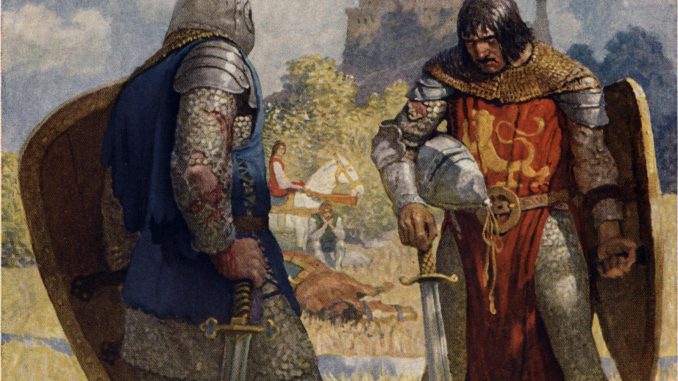
by Patrick LeClerc
This is an important question, both for writers and for readers. The anti hero has gain prominence lately, and there are a lot of reasons for that. But it’s less a question of “should my protagonist be flawed?” and more a question of “how flawed should my protagonist be?”
The perfect hero, the knight in shining armor, has fallen out of favor. Although, to be perfectly honest, I don’t remember him ever being much in favor, outside of children’s fiction, and legends. Possibly the best known truly spotless heroes in modern fiction would be in Tolkien’s Lord of the Rings. Other than Boromir, the members of the fellowship are about as flawless as you can get.
Even there, the real viewpoint characters are the Hobbits, who aren’t anti-heroes by any stretch, but are the easiest to identify with. They’re more or less everyman characters, simple folk thrust into the role of hero by a situation. While they never venture into the moral grey area that defines an anti-hero, the can show enough fear and doubt that lets us in. Allows us to empathize a bit. It’s hard to really identify with Aragorn, but we can identify with Sam or Frodo, who are allowed to express fear, hunger, fatigue and doubt, so long as they carry on with stiff upper lips. Those moments of vulnerability humanize them.
Aside from LOTR, though, most heroes have some nice, meaty flaws, and grapple with some choices and situations where it’s not as clear cut that they will just “do the right thing” or even recognize what that thing is. Many of them have a little bit of moral flexibility.
In theory, I like that. I think a well rounded character can and should have some complexity. The question is how far into the grey can they go and remain a hero.
Sword and Sorcery stories have a rich tradition of anti heroes. Conan, Elric, Fafhrd and the Grey Mouser, Kane. All these characters aren’t exactly good guys, but they are objectively better than the bad guys. They also lived in a world dominated by shades of grey. There were no dark lords facing noble princes of the Free People. There were certainly evil sorcerers, rampaging hordes, even dark gods summoned by deluded cultists, But the people of the worlds were, by and large, people. Neither wholly good or evil.
Detective fiction had its own variation on this character. Sam Spade and Philip Marlowe are heroes in this vein. Tough, hard, coarse men. The implication was that they had the necessary traits to get the job done in a world where, to quote the Bard himself, Bob Dylan, “blackness was a virtue.” What separated them from the villains of the piece was they had a code of honor. A line they wouldn’t cross.
A more lighthearted version of this protagonist is the Lovable Rogue. By definition this character doesn’t play by society’s rules. They may be a smuggler, a highwayman, a pirate, a con man, a thief, a bounty hunter. These characters live outside the law, or just on the edge of it. But again, there are depths to which they will not stoop, and they usually oppose enemies who are truly evil, and often have the law on their side. This character has kept Hollywood afloat for about 80 years. Robin Hood, Captain Blood, Han Solo. Enough flaws to be interesting, but enough honor that we want them for our hero.
More recently, the surging popularity of Grimdark fantasy has had its effect on heroes. The armor isn’t shining very bright, and the world is shading to a much darker grey. The setting is such that a truly good person won’t survive, let alone win the day. You still root for the heroes, because while they may be flawed, the alternative is unthinkable.
And sometimes, we can even watch a protagonist slip from anti hero to villain. We see them cross that line, and become as bad or worse than the foe. Sometimes it seems that these characters were created just to see how far we’d follow them down that dark path.
So how far can you go? Where is the bottom?
Maybe in an attempt to answer that question, or because he hated readers, or maybe because some men just want to watch the world burn, Stephen R Donaldson chose to inflict Thomas Covenant on the genre. Covenant isn’t really an anti hero, because even the worst anti hero usually has a few things that make them interesting. Covenant was self absorbed, cruel, and had sociopathic disregard for everyone around him. You can say the same for some of George R R Martin’s characters from A Song of Ice and Fire, but at least they are interesting characters. Villains with some ambition and panache. In addition to being a terrible person, Covenant was a whiny douche. Like if instead of leading an evil empire bent on world domination, Sauron just decided to show up at your place, broke and addicted to huffing paint thinner, and begged to stay on your couch, then assaulted your kids and stole your stuff and cried that the system was to blame and he has a condition, man.
May have gone on a rant there, but I loathe Covenant.
But was it because of the terrible things he did or the good he failed to do, the pain he inflicted or allowed to happen because of his inaction? Or was it because he was so insufferably whiny and pathetic? Was I repulsed by the evil or the weakness?
Anyway, Donaldson gave us a nice point on the bottom of the scale for just how awful a protagonist can be.
So, the question from which I have strayed, is: On a scale of Thomas Covenant to Sir Galahad, just how flawed do you like your protagonist?
I like my anti-hero to have some honor. Some line that will not be crossed.